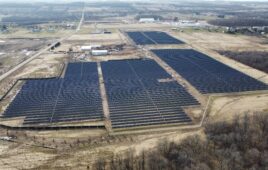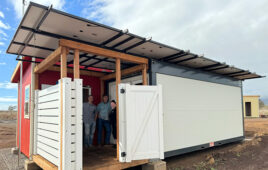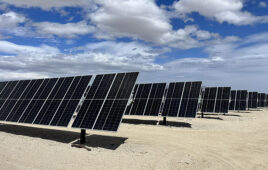On Nov. 13, Idaho Power Company (IPC) filed a proposal to change the rules for existing rooftop solar customers. This change would decrease the price Idaho Power pays rooftop solar owners for their excess energy by 50%, causing large increases to the monthly bills for the 4,000+ customers who have already adopted rooftop solar, and leaving an estimated 1,300 of those families and small businesses completely underwater on their investments.
“Idaho families deserve better from Idaho Power and the PUC,” said Ben Otto of the Idaho Conservation League. “Idahoans who chose to invest early in their energy freedom should not have the rules changed after the deal is done. Changing the math now is unfair and penalizes those who are leading Idaho into a clean energy future.”
In their comments, ICL and Vote Solar advocate for the PUC to protect existing Idaho Power residential and small business solar customers from new compensation rules that will replace net-metering next year.
“Utilities across the country are trying to stand between customers and clean, local, affordable solar energy,” said Briana Kobor of Vote Solar. “Maintaining fair pricing for existing customers is a commonsense compromise that allows both consumers and utilities to keep good-faith agreements.”
Net metering allows solar customers to receive a credit on their bill for the excess electricity they send back to the grid. Today, that credit is the same as the rate all customers pay Idaho Power for electricity. However, under a recently filed settlement that value would decrease over time to a rate 50% lower than today.
The PUC has already received 300 public comments on the proposal. The comment period is open until Dec. 3. Refer to docket IPC-E-18-15. There will also be public hearings Dec. 2 and 3. Join by phone at 1-800-920-7487 passcode 6674832# on Monday, Dec. 2 from 10 a.m. to 4 p.m., or in person starting at 7 p.m., Tuesday, Dec. 3 at the PUC’s office, 11331 W. Chinden Blvd., Building 8, Suite 201-A, Boise, ID 83714.
Idaho Power Company serves over 560,000 customers in Idaho and Oregon. Its service territory stretches across the state from Ontario, ID to Blackfoot, ID, and includes major metropolitan areas, Boise, Twin Falls and Pocatello. The company has committed to providing 100% clean energy by 2045, but by ending net metering and potentially lowering rates for existing solar customers Idaho Power is making it clear that it wants to be the only one that controls that affordable, reliable clean power.
Idaho’s solar industry currently employs 557 people and has invested over $645 million in the state. Idaho ranks 21st in installed solar with over 488 megawatts installed, enough to power 64,443 homes, according to the Solar Energy Industry Association.
News item from Vote Solar





I think the property tax valuation is way too high. Inverters have a 10 year life, panels loose efficiency over time and basing on alleged energy savings overtime is no better than the leasing schemes. Property tax valuation should be based on the true appreciable increase in real property value not some perceived savings over time. Property taxes are supposed to be based on appraised property values, and in many cases do not reflect the homeowners cost of installation. Property tax increases for additional square footage for instance reflect increased appraised valuation not cost. The proposed tax increase effectively “steals” the only method the homeowner has to recover costs, and real property values have never increased just because a property has solar power, it is viewed as a buyer incentive or “curb appeal” not a tangible asset.
Solar barely achieves a net return on investment over a ten year amortization which includes current net metering rates. If the net metering rates decrease and property tax rates increase, ROI could be pushed out beyond useful service life of the installed equipment, never achieving a net zero.
With things going as they are in Idaho and a few other states / regions, the only option rising to the surface for individuals, small businesses & larger companies is to start incorporating battery storage and going to a self generation & consumption model. Battery pack prices are falling & fast along with massively increasing production of LifePO type batteries which are perfect for storage. Case in point, I just purchased a 24V/400AH LifePO pack with internal BMS for $2999 USD including free S&H.
ROI with self-generation, storage & use I feel is better, because this also eliminates taxes & fees not only for selling excess to the utility (at a lower rate than market value) but when buying it back at market value with taxes, delivery fees etc all tacked on. It adds up fast, when you do the math !
““Idaho families deserve better from Idaho Power and the PUC,” said Ben Otto of the Idaho Conservation League. “Idahoans who chose to invest early in their energy freedom should not have the rules changed after the deal is done. Changing the math now is unfair and penalizes those who are leading Idaho into a clean energy future.””
This is going on across the country, this is just another example. I believe Louisiana pretty much gutted net metering and has some kind of net billing in place now. It is egregious and dangerous to take established PPAs and be able to change the “contract” somewhere down the line. The utility’s word means nothing, as does their PPA. It would be more cost effective if the adopters would install their own solar PV energy storage system and keep most of their energy for later use in the day. It’s time for smart energy storage and self consumption since the utility doesn’t necessarily honor their long term contracts.
Vote to approve solar mandate on new construction similar to legislation already passed in Miami.
Historically preserve land use to protect local ecosystems.
Ban all solar leasing county wide.
Require local inspection from third party to insure compliance of solar mandate on new homes.
Fine all non compliant new structures that do not have solar electric generating equipment.
Require FPL to install net meters on all new construction.
Require FPL to credit any surplus energy created with solar to the end user at the rate of 23 cents per KWH or cash reimbursement at a rate of 11 1/2 cents per KWH
Allow property tax abatement for 100% of the total cost of solar equipment not including labor.
Require monitoring of all solar equipment countywide for reporting of carbon reduction to a public county website.
Property tax appraiser shall increase the value of new construction with solar by the amount of money saved on electric over the 20 year guaranteed operational life cycle of the solar electric generating equipment (KWH generated annually through solar multiplied by the rate of actual energy cost to homeowner subject to escalating rise in rates multiplied by 20 yrs) Representing the overall increased value for the mortgage-able property through the tax appraisers assessed value.